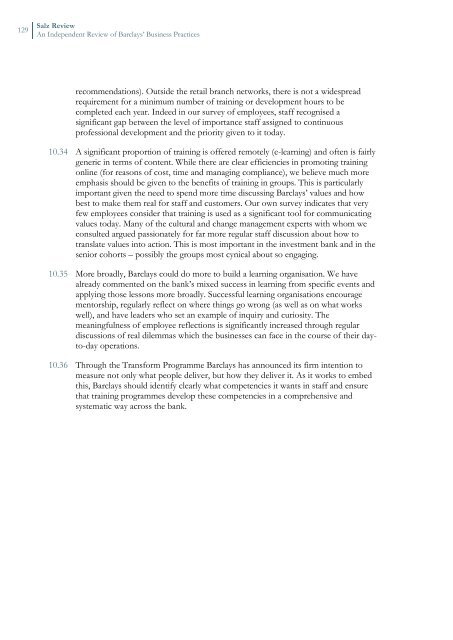Salz Review - Wall Street Journal
Salz Review - Wall Street Journal
Salz Review - Wall Street Journal
Create successful ePaper yourself
Turn your PDF publications into a flip-book with our unique Google optimized e-Paper software.
129<br />
<strong>Salz</strong> <strong>Review</strong><br />
An Independent <strong>Review</strong> of Barclays’ Business Practices<br />
recommendations). Outside the retail branch networks, there is not a widespread<br />
requirement for a minimum number of training or development hours to be<br />
completed each year. Indeed in our survey of employees, staff recognised a<br />
significant gap between the level of importance staff assigned to continuous<br />
professional development and the priority given to it today.<br />
10.34 A significant proportion of training is offered remotely (e-learning) and often is fairly<br />
generic in terms of content. While there are clear efficiencies in promoting training<br />
online (for reasons of cost, time and managing compliance), we believe much more<br />
emphasis should be given to the benefits of training in groups. This is particularly<br />
important given the need to spend more time discussing Barclays’ values and how<br />
best to make them real for staff and customers. Our own survey indicates that very<br />
few employees consider that training is used as a significant tool for communicating<br />
values today. Many of the cultural and change management experts with whom we<br />
consulted argued passionately for far more regular staff discussion about how to<br />
translate values into action. This is most important in the investment bank and in the<br />
senior cohorts – possibly the groups most cynical about so engaging.<br />
10.35 More broadly, Barclays could do more to build a learning organisation. We have<br />
already commented on the bank’s mixed success in learning from specific events and<br />
applying those lessons more broadly. Successful learning organisations encourage<br />
mentorship, regularly reflect on where things go wrong (as well as on what works<br />
well), and have leaders who set an example of inquiry and curiosity. The<br />
meaningfulness of employee reflections is significantly increased through regular<br />
discussions of real dilemmas which the businesses can face in the course of their dayto-day<br />
operations.<br />
10.36 Through the Transform Programme Barclays has announced its firm intention to<br />
measure not only what people deliver, but how they deliver it. As it works to embed<br />
this, Barclays should identify clearly what competencies it wants in staff and ensure<br />
that training programmes develop these competencies in a comprehensive and<br />
systematic way across the bank.
















